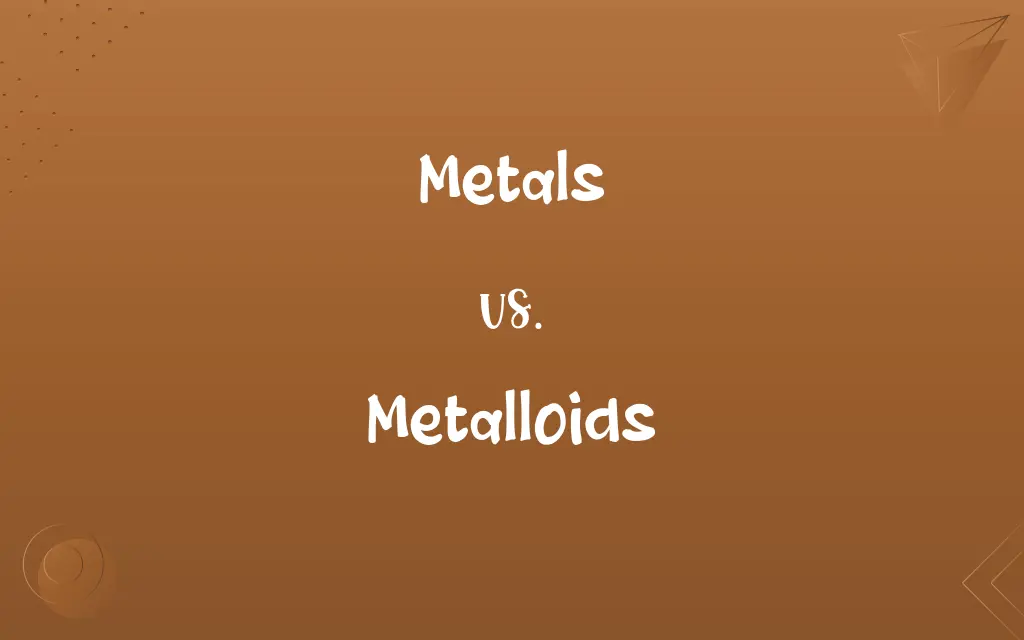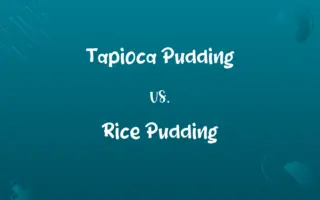Metals vs. Metalloids: Know the Difference

By Shumaila Saeed || Updated on December 25, 2023
Metals are elements with high electrical conductivity, luster, and malleability, while metalloids exhibit properties between metals and nonmetals.

Key Differences
Metals are typically solid at room temperature (except mercury), known for their shiny luster, high electrical and thermal conductivity, and malleability. Metalloids, in contrast, have a mixture of metallic and nonmetallic properties, making them less conductive than metals and often more brittle.
Shumaila Saeed
Nov 15, 2023
Metals can easily lose electrons, making them good conductors of electricity. They are usually ductile, allowing them to be drawn into wires. Metalloids, however, have a more variable ability to conduct electricity, often changing with temperature, and they are less malleable than metals.
Shumaila Saeed
Nov 15, 2023
The reactivity of metals varies widely; some, like sodium, react violently with water, while others, like gold, are very unreactive. Metalloids often have intermediate reactivity, being neither as reactive as the most active metals nor as inert as the most inactive metals.
Shumaila Saeed
Nov 15, 2023
Metals are generally found on the left side and in the center of the periodic table and include groups such as alkali metals and transition metals. Metalloids are found along the metal-nonmetal dividing line in the periodic table, including elements like silicon and germanium.
Shumaila Saeed
Nov 15, 2023
In alloys, metals often form the primary component, imparting strength and electrical conductivity. Metalloids are used in smaller quantities in alloys and extensively in the semiconductor industry due to their variable electrical conductivity.
Shumaila Saeed
Nov 15, 2023
ADVERTISEMENT
Comparison Chart
Position in Periodic Table
Left side and center
Along the metal-nonmetal dividing line
Shumaila Saeed
Nov 15, 2023
ADVERTISEMENT
Metals and Metalloids Definitions
Metals
Elements that are good conductors of heat and electricity.
Copper, a metal, is widely used in electrical wiring.
Shumaila Saeed
Nov 15, 2023
Metalloids
Substances that can exhibit both metallic and nonmetallic properties.
Boron, a metalloid, is used in glassmaking and as a semiconductor.
Shumaila Saeed
Nov 15, 2023
Metals
Substances with a characteristic luster when freshly prepared, polished, or fractured.
The ring was made of shiny gold, a precious metal.
Shumaila Saeed
Nov 15, 2023
Metalloids
Elements that may act as electrical conductors under certain conditions.
Germanium, a metalloid, is used in transistors and diodes.
Shumaila Saeed
Nov 15, 2023
Metals
Chemical elements that readily form cations and ionic bonds with nonmetals.
Sodium, a highly reactive metal, forms sodium chloride when combined with chlorine.
Shumaila Saeed
Nov 15, 2023
ADVERTISEMENT
Metalloids
Materials often used in semiconductors and modern technology.
Arsenic, a metalloid, is used in some types of semiconductor devices.
Shumaila Saeed
Nov 15, 2023
Metals
Elements found on the left side and in the center of the periodic table.
Aluminium, a lightweight metal, is used for making cans.
Shumaila Saeed
Nov 15, 2023
Metalloids
Elements located along the metal-nonmetal dividing line of the periodic table.
Antimony, a metalloid, is used in flame retardants and alloys.
Shumaila Saeed
Nov 15, 2023
Metals
Any of a category of electropositive elements that usually have a shiny surface, are generally good conductors of heat and electricity, and can be melted or fused, hammered into thin sheets, or drawn into wires. Typical metals form salts with nonmetals, basic oxides with oxygen, and alloys with one another.
Shumaila Saeed
Oct 19, 2023
Metalloids
Elements with properties intermediate between metals and nonmetals.
Silicon, a metalloid, is crucial in making computer chips.
Shumaila Saeed
Nov 15, 2023
Metalloids
A nonmetallic element, such as arsenic, that has some of the chemical properties of a metal. Most metalloids behave as semiconductors.
Shumaila Saeed
Oct 19, 2023
Metalloids
A nonmetallic element, such as carbon, that can form an alloy with metals.
Shumaila Saeed
Oct 19, 2023
Metals
(rail transport) the rail tracks owned by a company or organisation; a rail network
It was appropriate that 'King' number 6000 began the return to steam on British Rail metals in 1971.
Shumaila Saeed
Oct 19, 2023
Metals
Materials that are typically hard, malleable, and ductile, with good thermal and electrical conductivity.
Iron, a metal, is essential for construction due to its strength.
Shumaila Saeed
Nov 15, 2023
Repeatedly Asked Queries
What is the most common use of metals?
Metals are commonly used in construction, wiring, and manufacturing due to their strength and conductivity.
Shumaila Saeed
Nov 15, 2023
What is a unique feature of metals?
Metals can be hammered into thin sheets (malleability) or drawn into wires (ductility).
Shumaila Saeed
Nov 15, 2023
How do metalloids differ from nonmetals?
Metalloids have some metallic properties, unlike nonmetals which generally do not.
Shumaila Saeed
Nov 15, 2023
Are metals typically reactive?
Metals vary in reactivity; some, like alkali metals, are very reactive, while others, like platinum, are not.
Shumaila Saeed
Nov 15, 2023
Can metalloids conduct heat?
Metalloids generally conduct heat less efficiently than metals.
Shumaila Saeed
Nov 15, 2023
What are metalloids?
Metalloids are elements with properties between metals and nonmetals.
Shumaila Saeed
Nov 15, 2023
Can metals be liquid?
Most metals are solid at room temperature, but mercury is a liquid metal.
Shumaila Saeed
Nov 15, 2023
Are metalloids used in alloys?
Metalloids are sometimes used in alloys but are more significant in the semiconductor industry.
Shumaila Saeed
Nov 15, 2023
Are metalloids good conductors of electricity?
Metalloids have variable electrical conductivity, often dependent on temperature.
Shumaila Saeed
Nov 15, 2023
What is a key use of metalloids?
Metalloids are widely used in the semiconductor industry.
Shumaila Saeed
Nov 15, 2023
What are metals?
Metals are elements with high electrical and thermal conductivity, luster, and malleability.
Shumaila Saeed
Nov 15, 2023
Are all metals shiny?
Most metals have a characteristic luster, especially when polished.
Shumaila Saeed
Nov 15, 2023
Do metalloids react with water?
Metalloids generally have less reactivity with water compared to metals.
Shumaila Saeed
Nov 15, 2023
Can metals be nonmagnetic?
Yes, not all metals are magnetic. For example, copper and aluminum are nonmagnetic.
Shumaila Saeed
Nov 15, 2023
What distinguishes metals from other elements on the periodic table?
Metals are distinguished by their high conductivity, malleability, and often high density.
Shumaila Saeed
Nov 15, 2023
Can metals be transparent?
Metals are generally opaque, whereas some metalloids can be semitransparent.
Shumaila Saeed
Nov 15, 2023
Are all metalloids used in electronics?
Many, but not all, metalloids have applications in electronics due to their semiconductor properties.
Shumaila Saeed
Nov 15, 2023
Is silicon a metal or a metalloid?
Silicon is a metalloid, with properties between metals and nonmetals.
Shumaila Saeed
Nov 15, 2023
Are metalloids found in nature?
Yes, metalloids like silicon and boron are naturally occurring elements.
Shumaila Saeed
Nov 15, 2023
Do metals have a high melting point?
Most metals have high melting points, but there are exceptions like mercury.
Shumaila Saeed
Nov 15, 2023
Share this page
Link for your blog / website
HTML
Link to share via messenger
About Author
Written by
Shumaila SaeedShumaila Saeed, an expert content creator with 6 years of experience, specializes in distilling complex topics into easily digestible comparisons, shining a light on the nuances that both inform and educate readers with clarity and accuracy.



































































